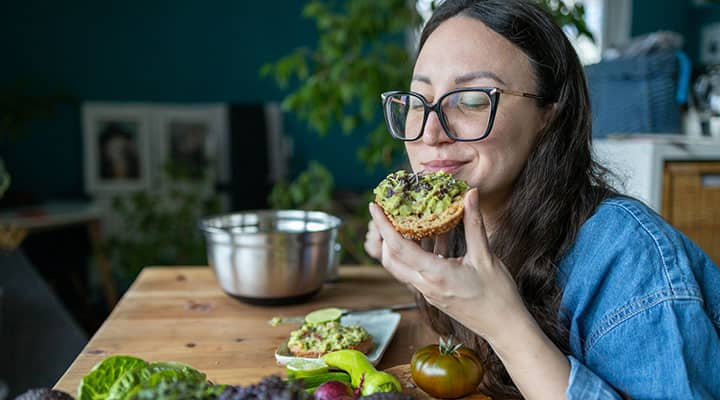
Avocado Nutrition Facts: 10 Benefits for a Stronger, Healthier Body
Avocado Nutrition Facts: 10 Benefits for a Stronger, Healthier Body
At a Glance
- Avocado consumption can support fat loss for a healthy body weight.
- Avocados are good for your metabolic and heart health because they contain monounsaturated fatty acids and bioactive compounds.
- Eating avocados regularly is also beneficial to your gut health, skin, brain and vision.
- The flesh, seed, and oil of the avocado deliver antioxidant vitamins, minerals and fiber.
Great news for avocado toast lovers: The many health benefits of avocado mean that you can and should incorporate this delicious fruit (yes, it's a fruit!) into your regular diet.
Forget what you know about fatty foods being bad for your waistline. The type of fat in this delicious green snack, along with its other nutrients, makes avocado excellent for heart health, weight loss, cholesterol, and so much more. Keep scrolling to learn what avocado can do for you.
What are the health benefits of avocado?
You may already know about avocado fiber benefits and maybe you've even tried avocado for skin and hair, but the reasons to eat avocado extend much further. Avocados are packed with healthy fats and nutrients that deliver a whole slew of benefits for your body.
1. Helps trim belly fat
If you're looking to burn belly fat, incorporating an avocado into your meals may do your waistline some good. Avocados are packed with healthy, monounsaturated fats, which increase fat burning and help expend calories after eating. In fact, a clinical study suggests one avocado per day may help reduce abdominal fat in women.
Avocados are also high in fiber, meaning they can help you feel full longer and prevent overeating, which supports weight management.
2. Heart health
Yes, you should eat avocado for your heart health! The monounsaturated fatty acids in avocados support already-healthy cholesterol levels and cardiovascular wellness.
Furthermore, avocado consumption may help reduce total cholesterol and low-density lipoprotein cholesterol (LDL-C) in individuals who have too much cholesterol in their bloodstream—a condition known as hypercholesterolemia.
3. Brain health
Having a serving of guacamole can support brain health and cognitive function, thanks to the healthy fats and bioactive compounds in this delicious green fruit.
4. Glucose levels and metabolic health
Because avocado is a very low-glycemic index food, it's a staple to support metabolic health and may encourage better glucose levels. In other words, it won't spike your blood sugar after you eat it.
This makes it a great food for people who are overweight or dealing with insulin resistance.
5. Healthy inflammatory response
As we mentioned earlier, avocado contains many bioactive compounds, including polyphenols, that support a healthy inflammatory response.
6. Vitamins and minerals
Avocado is an excellent source of folate (a B vitamin), plus it's also a good source of other vitamins and minerals like magnesium, potassium, and vitamin B6, which help support cardiovascular health.
7. Gut health
The high fiber content in avocados serves as a source of prebiotics for healthy gut microbes. Intestinal microbiota play a big role in your overall health and are a factor in the development of obesity and its related diseases, including diabetes and cardiovascular disease.
8. Eye health
Avocado contains both lutein and zeaxanthin (about 135 mcg per serving), carotenoids that are beneficial for macular health, especially as you age.
9. Skin health
To better support your skin health, snack on avocado. The antioxidants and vitamins C and E in this fruit will work wonders.
10. May protect cells and DNA from damage
In preclinical studies, the phytochemicals in avocado have been shown to support healthy cell growth and even prevent harmful cell growth.
Which part of the avocado is healthiest?
In most cases, you're eating the flesh of the avocado—the soft, green part inside. But that's not all the fruit offers. Each part of the avocado offers distinct nutrients.
| Avocado part | Nutrients | Primary benefits |
|---|---|---|
| Flesh | Monounsaturated fats (oleic acid), fiber, potassium, folate, vitamin E, vitamin C, carotenoids (lutein, zeaxanthin) |
|
| Oil | Oleic acid, phytosterols, vitamin E, polyphenols |
|
| Seed (extract) | Polyphenols, flavonoids, procyanidins, dietary fiber |
|
Note: The seed/pit of an avocado is very hard and not readily edible, plus there are no human studies demonstrating its safety or efficacy. Some people dry them out in the oven, then put them in a blender or food processor to turn them into a powder that can be added to salads, smoothies, and other meals. If you want to try consuming the seed, do so in moderation and with caution—try very small amounts and see how you feel afterward.
Besides eating avocados, what can I do to burn belly fat?
Eating avocados can be a great way to help burn belly fat, but if you are looking to manage your weight, you'll need to follow a healthy diet and exercise regularly.
Exercise
: For weight management success, you should aim for 300 minutes of heart-pumping exercise each week. That may sound like a lot, but it's really only one hour per day, five days a week. Make sure to pick an activity that you enjoy doing and that causes you to break a sweat, too. Running, tennis, yoga, HIIT, and swimming are all great cardiovascular activities that will help jumpstart your metabolism and burn belly fat. If it's been a while since you worked out, a brisk walk is a great place to start.Diet
: Avocados may be delicious, but you'll need other food groups in your diet to support weight loss. Try to minimize sugar and processed foods, as they will sabotage your weight management goals. Instead, follow a Mediterranean-based diet and stick to fresh fruits and vegetables, whole grains, lean protein, and healthy fats (like avocados and extra virgin olive oil).Take nutrients for support
: It is no surprise that shedding pounds gets harder as you age. Partly because, over time, an enzyme in your body, AMPK, declines and causes the accumulation of abdominal fat. Luckily, there are nutrients that support healthy AMPK levels to help your body burn stored fat and promote healthy cellular metabolism.
Alongside healthy lifestyle choices—like smart nutrition, regular exercise, quality sleep, and sufficient hydration—incorporating avocados into your diet can help support your weight loss goals, heart health, and glucose levels.
Try spreading it on a slice of whole grain toast, adding some to your smoothie, or eating it with a drizzle of honey and cayenne for a sweet and spicy kick!
How does avocado help with metabolism?
Avocado is a good source of dietary fiber and it's high in monounsaturated fats (especially oleic acid), which are readily used by the body for energy rather than stored as fat. The fiber and the heart-healthy fats help maintain a steady energy supply, and it also promotes satiety, meaning a feeling of fullness.
Plus, low-glycemic index foods like avocados support healthy glucose levels.
How much avocado should I eat daily for weight loss?
There is no one-size-fits-all approach, as the amount you eat can be influenced by several factors, especially what the rest of your diet looks like. A clinical study showed results with participants eating one Hass avocado a day. However, consider your daily nutrition in its entirety and how you can fit an avocado's calories into your diet alongside everything else you eat.
Is avocado high in calories?
Avocado is not considered a low-calorie food. However, it is nutrient-dense. Their fat content gives avocados more calories than other fruits, but avocado is less energy-dense than processed foods—meaning that the amount of nutrients you get relative to the caloric content is significantly better.
Is it okay to eat avocado every day?
Yes, you can eat avocado every day. Just keep in mind that it is higher in calories than other fruits and vegetables, so you should keep an eye on your total calorie intake, especially if you're trying to better manage your weight.
What’s the difference between eating avocado and using avocado oil?
Avocado oil contains many of the same nutrients as whole avocado, but it does not have fiber.
Key Takeaways
- Because of their monounsaturated fats, avocados help burn fat and calories, and they also keep you full.
- Avocado is also a great source of dietary fiber, folate, magnesium, potassium, and vitamin B6, as well as polyphenols and carotenoids.
- You can safely eat avocado every day but do keep in mind that it's more calorie-dense than other fruits.
References
- Bangar SP, et al. "Avocado seed discoveries: Chemical composition, biological properties, and industrial food applications." Food Chem X. November 2022. https://pubmed.ncbi.nlm.nih.gov/36573158/
- Cervantes-Paz B, Yahia EM. "Avocado oil: Production and market demand, bioactive components, implications in health, and tendencies and potential uses." Compr Rev Food Sci Food Saf. July 2021. https://pubmed.ncbi.nlm.nih.gov/34146454/
- Collignon TE, et al. "Avocado (Persea americana Mill) and its phytoconstituents: potential for cancer prevention and intervention." Crit Rev Food Sci Nutr. 2024. https://pubmed.ncbi.nlm.nih.gov/37830928/
- Drakpa D, et al. "Avocado Oil: Recent Advances in Its Anti-diabetic Potential." Curr Med Sci. February 2025. https://pubmed.ncbi.nlm.nih.gov/39998768/
- Dreher ML. "Whole Fruits and Fruit Fiber Emerging Health Effects." Nutrients. November 2018. https://pmc.ncbi.nlm.nih.gov/articles/PMC6315720/
- Dreher ML, et al. "A Comprehensive Review of Hass Avocado Clinical Trials, Observational Studies, and Biological Mechanisms." Nutrients. December 2021. https://pubmed.ncbi.nlm.nih.gov/34959933/
- Henning SM, et al. "Hass Avocado Inclusion in a Weight-Loss Diet Supported Weight Loss and Altered Gut Microbiota: A 12-Week Randomized, Parallel-Controlled Trial." Current Developments in Nutrition. August 2019. https://cdn.nutrition.org/article/S2475-2991%2822%2913043-X/fulltext
- James-Martin G, et al. "Avocado Consumption and Cardiometabolic Health: A Systematic Review and Meta-Analysis." J Acad Nutr Diet. February 2024. https://pubmed.ncbi.nlm.nih.gov/36565850/
- Okobi OE, et al. "Effect of Avocado Consumption on Risk Factors of Cardiovascular Diseases: A Systematic Review and Meta-Analysis." Cureus. June 2023. https://pubmed.ncbi.nlm.nih.gov/37525782/
- Zhang X, et al. "Avocado Consumption for 12 Weeks and Cardiometabolic Risk Factors: A Randomized Controlled Trial in Adults with Overweight or Obesity and Insulin Resistance." J Nutr. August 2022. https://pubmed.ncbi.nlm.nih.gov/35700149/
About Our Story Sources
The Life Extension Health News team delivers accurate information about vitamins, nutrition and aging. Our stories rely on multiple, authoritative sources and experts. We keep our content accurate and trustworthy, by submitting it to a medical reviewer.







